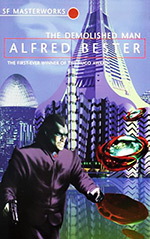
![]() Emil
Emil
1/10/2011
![]()
I really liked this book. I mean, I really liked this book.
Not only Alfred Bester's first novel, but also the winner of the first-ever Hugo Award (1953), it is lightning-paced, hard and glittering, with disciplined, taut prose, which raised the bar for writers wishing to escape the confounds of established science fiction of that era, succeeding brilliantly in vibrant word-painting and premise that inspired notables like Delany, Moorcock and Gibson. The reading is an exhilarating ride (I finished it in one and a half days).
Ben Reich is the capricious, profit-driven head of the Monarch Corporation, haunted by a recurring nightmare of a man with no face. He seeks help from a telepathic psychiatrist and realises that the only means to rid himself of the nightmare is to rid himself of his business rival D'Courtney. But in a world filled with "Peepers", policemen with various levels of ESP ability, committing murder is a tricky business. Reich nevertheless embarks on this atavistic purpose despite the threat of the ultimate sentence: demolition. It is essentially a murder mystery with a cunning villian and the obligatory relentless detective in pursuit, recognising that while technology will change, basic human nature will not.
Alongside the effervescent plot with an odd twist or two, salient characters and enough energy to fuel any torchship, Bester also employs innovative techniques to tell his story. He uses typographical layouts in poetry format to represent the mental conversations of the telepaths, often interspersed with "normal" dialogue, creating a very "real" reading experience. Bester's inventiveness is remarkable!
The psychology, arguably Freudian and motivated by oedipal feelings, is somewhat dated, but the reading is still a romp nonetheless. A tour de force of satire, lyricism, stylistic playfulness and pure science fiction invention. And reveals just why other writers continue to admire Alfred Bester so much.
"Be grateful that you only see the outward man. Be grateful that you never see the passions, the hatreds, the jealousies, the malice, the sicknesses... Be grateful you rarely see the frightening truth in people."